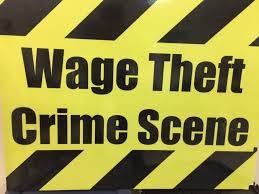When most people hear the word “theft,” they think of masked burglars, armed robbers, or pickpockets slipping wallets out of unsuspecting pockets. But there’s a form of theft that happens in boardrooms, small offices, construction sites, hospitals, farms, and factories every single day. It doesn’t involve balaclavas or breaking into safes. Instead, it hides behind polite smiles, payslip jargon, and the illusion of normal business. It’s called wage theft, and it’s one of the most pervasive yet under-discussed crimes in the workplace.
This isn’t a minor clerical error. Wage theft is when employers deliberately or negligently withhold wages, benefits, or entitlements that workers have rightfully earned. It can take many forms – paying less than the minimum wage, forcing employees to work “off the clock,” denying legally required overtime pay, misclassifying staff to avoid benefits, or simply not paying for hours worked. Sometimes, it’s a delay tactic that stretches “salary payment day” into weeks or even months. Other times, it’s the flat-out refusal to pay.
The injustice is not only in the act itself but in its silence. Wage theft is a kind of robbery that doesn’t trigger police sirens. It happens quietly, often in industries where workers have the least power to fight back — hospitality, construction, domestic work, retail, security, agriculture. Victims are told to “be patient,” “show understanding,” or “remember how hard times are for the company.” In other words: tolerate being robbed.
Here’s the part that shocks people — in many countries, including Nigeria, wage theft robs more workers of money each year than armed robbery, burglary, or shoplifting combined. Yet, while armed robbery can lead to decades in prison, many employers who engage in wage theft face nothing more than a fine, a warning, or at worst, a small settlement years later. It’s a strange moral inconsistency: steal N5000 from a supermarket till and you’ll likely end up in a police cell; steal N5 million in unpaid wages from your staff and you might get invited to an awards dinner for “entrepreneur of the year.”
Wage theft is not always about greed alone — it’s about power. In many workplaces, the employer controls the pay, the schedule, the reference letters, and even the possibility of future work. For workers living paycheck to paycheck, speaking up is dangerous. The unspoken threat is always there: “If you complain, you’ll lose your job. And who will hire you next?” This fear is the oxygen that wage theft breathes. It keeps people quiet while their hard-earned money slips into someone else’s pocket.
The human cost is devastating. For some, it means school fees go unpaid, rent is overdue, and medical bills pile up. For others, it’s the quiet, corrosive erosion of dignity — knowing you’ve done the work, but the world won’t recognize it in your pay. Over time, it breaks trust not just in the employer, but in the very idea of fairness at work. And when trust dies, productivity follows. No one will give their best to a system that feels rigged against them.
It would be easier to fix wage theft if it always came in obvious packages, but it doesn’t. Sometimes it wears the disguise of “volunteer” work that should be paid, or “training” periods where people work for free with no real promise of a job. Sometimes it’s the overtime that magically disappears from the payroll system, or the annual leave that vanishes because “this year we’re too busy.” Other times, it’s the unpaid severance to laid-off staff who are told the company is “waiting for a contract to clear.”
The silence around wage theft is perhaps its most dangerous weapon. Many workers assume they’re alone in their experience, when in fact, it’s a widespread problem. Many employers assume they can get away with it, because for years, they have.
But here’s the truth: wage theft is not a small issue of administrative oversight — it is an economic crime. It distorts markets by allowing unethical employers to undercut honest competitors. It drives inequality by stripping workers of income they have legally and morally earned. It weakens communities because every stolen paycheck is less money spent on food, school, transport, and healthcare.
The fight against wage theft isn’t just a matter of “good HR practice” — it’s a matter of justice. It requires stronger labour laws, better enforcement, and cultural change within organizations. It requires employees knowing their rights and having safe, real ways to demand them without fear of retaliation. It requires that we stop seeing delayed or denied pay as a mere inconvenience and start calling it what it is: theft.
In the end, the most dangerous thing about wage theft is not the amount stolen, but the message it sends — that in the modern workplace, you can be robbed in broad daylight and expected to thank the thief for the opportunity. That is the quiet cruelty of it. And until we collectively treat wage theft with the same outrage we reserve for other crimes, millions will keep going to work every day only to be robbed at their desks, in their uniforms, and on their job sites — with not a siren in earshot.
Samuel Jekeli, a Human Resources Professional writes from, Abuja, Nigeria.



